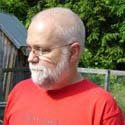Phenomenology of Teaching, Redux: I invited a guest lecturer to one of my classes recently, a gifted scientist. After I introduced him, he began slowly, haltingly, he rocked back & forth on his heels, hugged himself & looked generally uncomfortable. He stood near the computer where he could see on the monitor the slides he was projecting for the class & talked to the monitor. But after a few minutes a change came over him: It was like watching a bird begin to sing. He began to relax & enter the familiar language game of teacher / student, or scientist / layman. He became highly fluent & animated & the class relaxed, too. Because everyone knew what they were supposed to do. Everyone knew the rules of this / these language game(s). Oddly, as the "extra professor" sitting along the side of the class in a folding chair, I was the odd-man-out. I had not particularly specified role in this language game, so that when I offered a comment, sometimes I was more like a student & sometimes more like a professor. All of which suggests to me that teaching--& language itself--is fundamentally about social relationships. (I assume we will come back to this notion in the context of the private language argument. There are no truly solitaire games; meaning is always shared meaning.)
Aside: This afternoon I was talking to the freshmen in my hypertext course about how we make sense of texts as readers & writers. I was pushing the idea that we pop back & forth between reading & writing almost unconsciously--sometimes you see the vase, sometimes the two faces. I'd had them working with cut-up bits of Melville & Whitman, trying to get them to make their own texts out of this limited universe of raw material. After they had been working at this for about half an hour, I asked for volunteers to read what they had written. After several students had read fragments of their texts, I asked the class, "Who is the author of these texts?" The first responses were, confidently, "We are." But it wasn't long before--as I had hoped--a counter movement set in, suggesting that Melville & Whitman had to get some kind of credit. I was trying to discredit the commonsense (& analytically impoverished) notion that writing is self-expression, replacing it with the idea that meaning emerges as a kind of collaboration between perceiver & perceived, between text & reader, between mind/language & world. In my universe of reference, this is a Wordsworthian idea: in "Tintern Abbey," the poet makes the claim that we humans "half-create" the raw world of nature with our (essentially linguistic) consciousness & memory. Students, especially honors students like these, have distinguished themselves by being good in relationship to texts--submitting themselves to the text's authority. My little exercise was designed to get them to be bad in relationship to texts. Well, I'll be happy if I get them as far as Romantic literary theory; post-modernism can wait until they are sophomores. We become fully-enfranchised readers & writers when we become aware that we are playing language games & can take a playful & often deadly serious attitude to our use of language.
Philosophical Investigations
Christopher Robinson & Joseph Duemer read Wittgenstein's Philosophical Investigations


0 Comments:
Post a Comment
<< Home